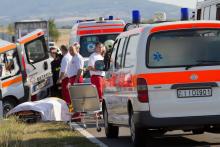Vehicle safety in Latin America and the Caribbean nations has come into the spotlight. Research shows a high level of deaths and injuries from car crashes in these regions. Worryingly, there is concern that the types of vehicles sold in Latin America and the Caribbean do not benefit from the latest safety features. As a result, high levels of occupant injuries and deaths are being recorded. The New Car Assessment Program for Latin America and the Caribbean (Latin NCAP), Global New Car Assessment Program (Gl
Vehicle safety in Latin America and the Caribbean nations has come into the spotlight. Research shows a high level of deaths and injuries from car crashes in these regions. Worryingly, there is concern that the types of vehicles sold in Latin America and the Caribbean do not benefit from the latest safety features. As a result, high levels of occupant injuries and deaths are being recorded. The New Car Assessment Program for Latin America and the Caribbean (Latin NCAP), Global New Car Assessment Program (Global NCAP) and El Poder del Consumidor (Consumer Power, Mexico) have been pushing together jointly to address this issue. Latin NCAP has unveiled new crash test results of cars that are widely sold in Latin America. The findings underscore a track record of double standards and the consistently low level of safety performance achieved by some car manufacturers in Latin America.
Many vehicle manufacturers persist in selling old models in Latin America and the Caribbean because these are cheap to produce, despite not featuring the latest safety technologies of newer models. As a result, Global NCAP is promoting its No Zero Star Cars Campaign, which is urging automakers to eliminate Zero Star Cars from the global vehicle fleet.
The United Nations General Assembly has adopted a resolution which represents the strongest ever commitment on road safety made by UN Member States. The resolution supports the ambitious road safety targets now included in the Global Goals for Sustainable Development and also the Global Plan of the UN Decade of Action for Road Safety (2011-2020) which provides an integrated and holistic framework for road injury prevention.
The resolution Invites Member States that have not already done so to consider adopting policies and measures to implement United Nations vehicle safety regulations or equivalent national standards. This would ensure that all new motor vehicles, meet applicable minimum regulations for occupant and other road users protection, with seat belts, air bags and active safety systems fitted as standard. The resolution builds upon the 'Brasilia Declaration' passed by the 2nd Global High Level Conference on Road Safety held on 18th-19th November 2015 in Brasilia and endorses the standard fitment of active safety systems which are the primary focus of the Stop the Crash Partnership. Active safety systems refer to vehicle technologies which rather than protecting people during a crash can avoid the crash from happening at all. Electronic stability control (ESC), autonomous emergency braking (AEB) and ABS for motorcycles are the key technologies.
Taken together the UN General Assembly resolution, the Brasilia Declaration, and the Global Plan for the Decade of Action (2011-2020) provide a clear statement of intent as regards the levels of safety for all new passenger cars by 2020 at the latest.
The Stop the Crash Partnership warmly welcomes the General Assembly's recognition of the vital contribution that crash avoidance technologies can play in contributing to the United nation's ambitious goal to halve road deaths and injuries by 2020.
Many vehicle manufacturers persist in selling old models in Latin America and the Caribbean because these are cheap to produce, despite not featuring the latest safety technologies of newer models. As a result, Global NCAP is promoting its No Zero Star Cars Campaign, which is urging automakers to eliminate Zero Star Cars from the global vehicle fleet.
The United Nations General Assembly has adopted a resolution which represents the strongest ever commitment on road safety made by UN Member States. The resolution supports the ambitious road safety targets now included in the Global Goals for Sustainable Development and also the Global Plan of the UN Decade of Action for Road Safety (2011-2020) which provides an integrated and holistic framework for road injury prevention.
The resolution Invites Member States that have not already done so to consider adopting policies and measures to implement United Nations vehicle safety regulations or equivalent national standards. This would ensure that all new motor vehicles, meet applicable minimum regulations for occupant and other road users protection, with seat belts, air bags and active safety systems fitted as standard. The resolution builds upon the 'Brasilia Declaration' passed by the 2nd Global High Level Conference on Road Safety held on 18th-19th November 2015 in Brasilia and endorses the standard fitment of active safety systems which are the primary focus of the Stop the Crash Partnership. Active safety systems refer to vehicle technologies which rather than protecting people during a crash can avoid the crash from happening at all. Electronic stability control (ESC), autonomous emergency braking (AEB) and ABS for motorcycles are the key technologies.
Taken together the UN General Assembly resolution, the Brasilia Declaration, and the Global Plan for the Decade of Action (2011-2020) provide a clear statement of intent as regards the levels of safety for all new passenger cars by 2020 at the latest.
The Stop the Crash Partnership warmly welcomes the General Assembly's recognition of the vital contribution that crash avoidance technologies can play in contributing to the United nation's ambitious goal to halve road deaths and injuries by 2020.










